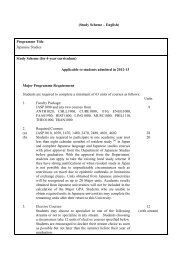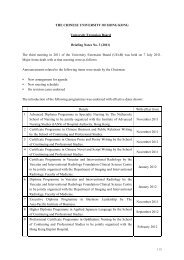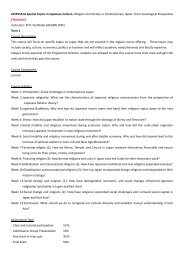ä¸è¼å ¨æ¸ - The Chinese University of Hong Kong
ä¸è¼å ¨æ¸ - The Chinese University of Hong Kong
ä¸è¼å ¨æ¸ - The Chinese University of Hong Kong
Create successful ePaper yourself
Turn your PDF publications into a flip-book with our unique Google optimized e-Paper software.
Susan Gano-Phillips, Affective Learning in General Education 15<br />
as GEPs are experienced by all students. As <strong>Hong</strong> <strong>Kong</strong> works to develop<br />
or revise GEPs, it is likely that affective learning outcomes will need to take<br />
their place alongside traditional cognitive learning outcomes, to best prepare<br />
students for the future.<br />
Writing Affective Intended Learning Outcomes (ILOs)<br />
As has been noted earlier, it is critically important to clearly state affective<br />
ILOs in order to allow for alignment <strong>of</strong> these outcomes with appropriate<br />
teaching and learning methods and assessment processes. Affective ILOs for<br />
individual courses or GEPs should be statements <strong>of</strong> what students are expected<br />
to be able to know, do, or value as a result <strong>of</strong> engaging in the learning process.<br />
Typically, it is best when ILOs are expressed from the students’ perspective,<br />
in the form <strong>of</strong> action verbs leading to observable and assessable behavior,<br />
and directly related to criteria for assessing student performance. Ideally, all<br />
outcomes should be achievable and assessable. ILOs can be specified at every<br />
level <strong>of</strong> the affective taxonomy (see Table 1 for examples).<br />
However, in the case <strong>of</strong> affective outcomes, there are several reasons<br />
why it may be particularly challenging to specify high-quality learning<br />
outcomes (Gronlund & Brookhart, 2009). First, the terminology used is<br />
<strong>of</strong>ten vague and little attention is given to defining what those outcomes are.<br />
Words like “appreciate,” shows “interest,” and “values” are fuzzy and <strong>of</strong>ten<br />
used in ILOs interchangeably when they may in fact have quite different<br />
technical meanings. This phenomenon is not unlike that in the cognitive<br />
domain, wherein vague statements like “understand” or “know” have come

















